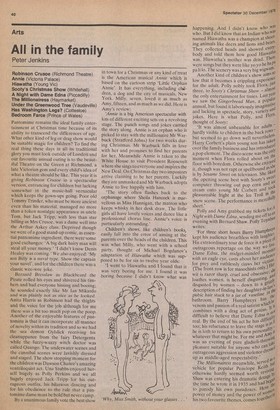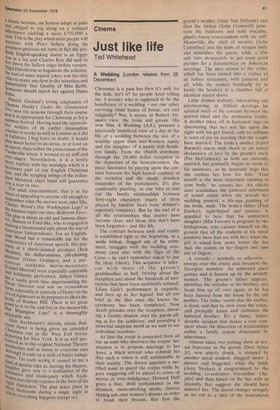All in the family
Peter Jenkins
Robinson Crusoe (Richmond Theatre) Annie (Victoria Palace) Hiawatha (Young Vic) Sooty's Christmas Show (Whitehall) A Night with Dame Edna (Piccadilly) The Millionairess (Haymarket) Under the Greenwood Tree (Vaudeville) Has Washington Legs? (Cottesloe) Bedroom Farce (Prince of Wales) Pantomime remains the ideal family entertainment at Christmas time because of its ability to transcend the differences of age. What other kind of leg or drag show would be suitable magic for children? To find the real thing these days in all its traditional glory you must look outside of London and our favourite annual outing is to the beautiful Theatre on the Green at Richmond, a late Victorian gem and every child's idea of what a theatre should be like. This year it is giving Robinson Crusoe in a spectacular version, entrancing for children but lacking somewhat in the music-hall vernacular which keeps the gown-ups going. Poor old Tommy Trinder, who must be more ancient even than his material, managed no more than a token nostalgic appearance as uncle Tom, but Jack Tripp, with less than star billing as Mrs Crusoe, was a dame well into the Arthur Askey class. Deprived though we were of a good stand-up comic, as essential pantomime ingredient, there were some good exchanges: 'A big dark hairy man will steal all your money.' I didn't know Denis Healey was coming.' We also enjoyed: `My son Billy is a naval type. Show the captain your navel', and for the children there was a classic wee-wee joke.
Bernard Bresslaw as Blackheard the Pirate rolled his eyes and shivered his timbers and had everyone hissing and booing; he sounded exactly like Mr Ian Mikardo and was plainly not as nice as he looked. Anita Harris as Robinson had the thights and the voice for the cil) although for me there was a bit too much pop on the poop. Another of the enjoyable features of pantomine is that it can incorporate all manner of novelty within its tradition and so we had the sea demon Oylslick receiving his cleanuppance from the fairy Detergenta while the fuzzy-wuzzy witch doctor was called Quango. The underwater scenes and the cannibal scenes were lavishly dressed and staged. The show stopping moment for the children was Dawson Chance's amazing ventriloquist act. Una Stubbs enjoyed herself hugely as Polly Perkins and we all hugely enjoyed Jack Tripp for his outrageous outfits, his hilarious dancing and for his obedience to the rule that a pantomime dame must be bold but never camp.
By a unanimous family vote the best show in town for a Christmas or any kind of treat is the American musical Annie which is based on the cartoon strip 'Little Orphan Annie'. It has everything, including children, a dog and the city of musicals, New York. Milly, seven, loved it as much as Amy, fifteen, and as much as we did. Here is Amy's review: 'Annie is a big American spectacular with lots of different exciting sets on a revolving stage. The punch songs and jokes carried the story along. Annie is an orphan who is picked to stay with the millionaire Mr Warbuck (Stratford Johns) for two weeks during Christmas. Mr Warbuck falls in love with her and promises to find her parents for her. Meanwhile Annie is taken to the White House to visit President Roosevelt where she sings to everyone and inspires the New Deal. On Christmas day two impostors arrive claiming to be her parents. Luckily they are unmasked and Mr Warbuck adopts Annie to live happily with him.
'The story often flashes back to the orphanage where Sheila Hancock is marvellous as Miss Hannigan, the matron who keeps whisky in her desk draw. The little girls all have lovely voices and dance like a professional chorus line. Annie's voice is particularly astounding.'
Children's shows, like children's books, easily fall into the error of aiming at the parents over the heads of the children. This was what Milly, who went with a school party, thought of Michael Bogdanov's adaptation of Hiawatha which was supposed to be for six to twelve year olds: 'I went to Hiawatha and I found that it was very boring for me. I found it was boring because I didn't know what was happening. And I didn't know who was who. But I did know that an Indian who was named Hiawatha was a champion at shooting animals like deers and lions and beals. They collected heads and showed eveT body and told them how good Hiawatha was. Hiawatha's mother was dead. There were songs but they were like yo yo he ha Pa, pa Ii lo. The scenery was a very big wigwaril. Another kind of children's show aims s° low that it becomes a crippling experience for the adult. Polly nobly took Flora, just, three, to Sooty's Christmas Show the only entertainment for tinies. Last Yea' we saw the Gingerbread Man, a popular annual, but found it laboriously imaginativAe and lacking in spectacle, story, variety an" jokes. Here is what Polly, and flura.
thought of Sooty: 'It was almost unbearable for adults hardly visible to children in the back rows-but seemed to go down well nevertheless. Harry Corbett's plain young son has take! over the family business and has introduce.' a pop element. The disco scene was the 011,1Y moment when Flora rolled about on n'cle floor with boredom. Otherwise she eniqe, it, though was not rapt or spellbound as s'dy is by Sesame Street on television. she like t the opening scene best with Sooty's swee computer throwing out pop corn and cream onto young Mr Corbett and Inui. pleasureable fright at the Ice Troll in r1ei, snow scene. The performance is merciful.' short.' Polly and Amy grabbed my tickets forAtt Night with Dame Edna, sending me Of to a evening with Bernard Shaw. Polly Toynt# writes: Tor three short hours Barry HurriPhreY: kept his audience breathless with langlireoi His extraordinary tour de force is a pieef.,,e. outrageous reportage on the way we lit'er Dame Edna, the midget-minded in°11s`ce with an eagle eye, casts about her a udiells. for prey and ruthlessly claws her viclet (The front row is for masochists only.) Pm wit is razor sharp, cruel and obsessive; siiPti loathes women, is herself disgusting, 31y disgusted by women down to a gizIgis description of finding her daughter-in:lathe pubic hair stuck to a jar of vaseline he bathroom. Barry Humphreys has ,the venom and passion of a real satirist combines with a drag act of genius. 1'01 difficult to believe that Dame Edna is,dilty real. By the end of his act he has diffle's too; his reluctance to leave the stage i5„9, he is loth to return to his own personaw;,; whatever that might be. For me and Aru?og was an evening of pure gladioli-thrOlte pleasure suitable for anyone who can tased outrageous aggression and violence dres up as middle-aged respectability.' ei The Millionairess meanwhile, servebat vehicle for popular Penelope Kel.r.,11,-fig. otherwise hardly seemed worth rev"" Shaw was entering his dramatic dotage to the time he wrote it in 1935 and had negthe to parody his own paradoxes. Hcre..„0. power of money and the power of wcrt his two favourite themes, comes togewe a bionic heroine, an heiress adept at judo and obliged to jog along on a reduced inheritance yielding a mere £750,000 a Year. This is the play which most people will associate with Peter Sellers doing his goodness-gracious-me turn; in fact the perfeetlY English-speaking doctor is an Egyptian in a fez and Charles Kay did well to live down the Sellers stage-Indian version. Nigel Hawthorne as Sagamore the solicitor, the butt of some topical jokes, was the only other to make any dent in the relentless and indomitable Star Quality of Miss Keith. Someone should match her against Dame Edna.
Patrick Garland's loving adaptation of Thomas Hardy's Under the Greenwood Tree sees the seasons through their course and is as appropriate for Christmas as for a Summer festival. Having read the appreciaI've notices of its earlier incarnation Whether it works as well in London as it did in Salisbury I beg leave to doubt, it would Play much better in an arena, or at least on an apron, than within the prescenium of the Vaudeville where it seemed to us stiff and ever-stagey. Nevertheless, it is a lovely story, replete with the nostalgia which is a fnecessaly part of our English Christmas 'are, and the scraping strings of the redundant Melstock choir band will guarantee You a tear or two. For adult entertainment, that is in the sense of appealing to anyone old enough to ,remember what the movies were once like, ■ -harles Wood's Has Washington Legs? is funniest night out since Bedroom Farce. ttne Play is about an old and famous direcOr, Huston or Ford-like, who is engaged in making a bicentennial epic about the war of American Independence. For an English!nail Wood has a remarkable ear for the Insincerities of American speech. His poi.raits of a shark-skinned producer (Bob °skins), his dollar-anxious, pill-chewing tassistant (Gawn Grainger) and a pre(el!. ticms academic movie-mercenary (1nel Murton) were especially enjoyable ictind brilliantly performed. Albert Finney a vastly good time impersonating the f_reat Director and was on tremendous c.rin, especially in a parody of Henry on the .ve of Agincourt as he prepares to shoot the 13 oattle of Bunker Hill. There is no great }1°`nt to it lathe end but in the meanwhile e ca, Wasington Legs? is a thoroughly nJoYable skit. r° Alan Ayckbourn's already classic BedFarce is being given an extended ■ ;nristmas run in the West End before IfieParting for New York. It is as well pertied as in the original National Theatre "eduction and as funny as everyone says .thnugh it ends on a not of bitter unhaprc!ness. On each seeing it caused in me a jaitInd,of double take as, leaving the theatre, 10 gnter gave way to a realisation of the b neliness and inadequacy which Ayck: tirn mercilessly exposes in the lives of his thglit characters. The play takes place in wkre, e bedrooms during a single night in "'eh everything happens except sex.























































 Previous page
Previous page